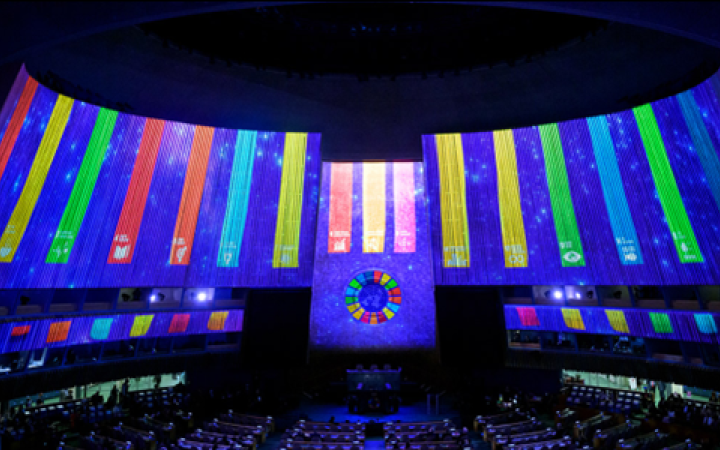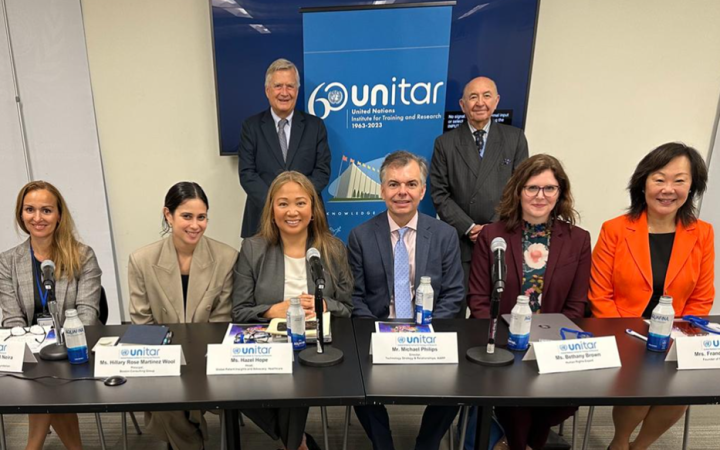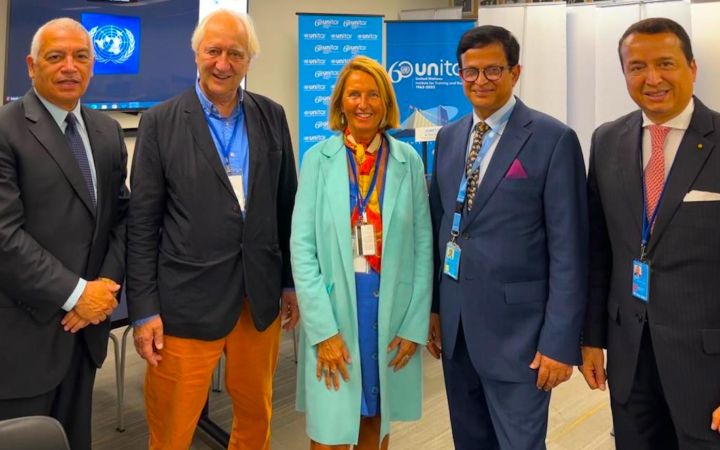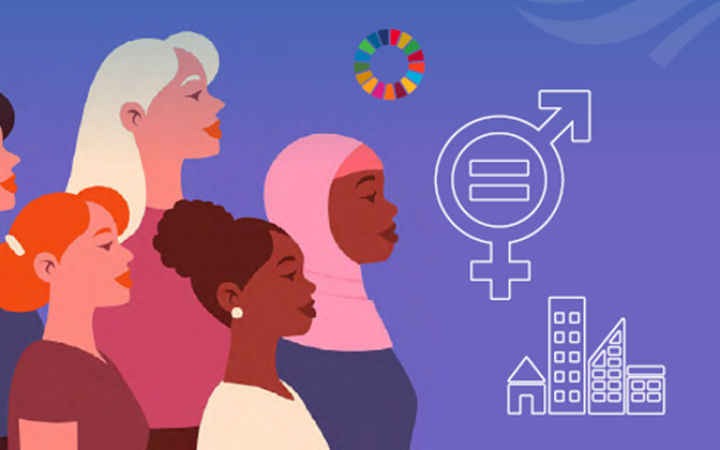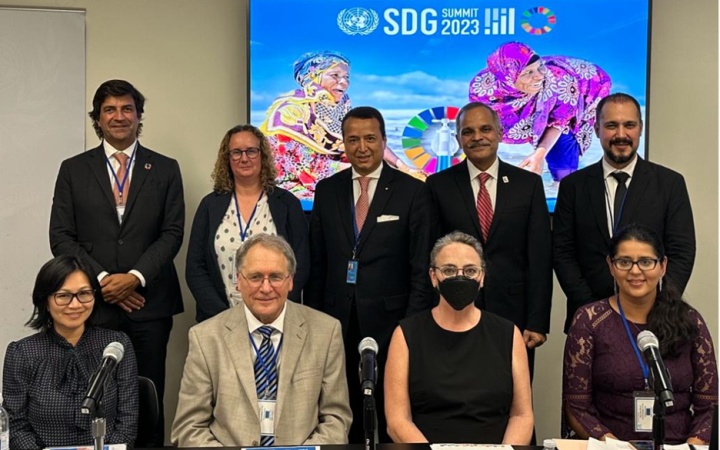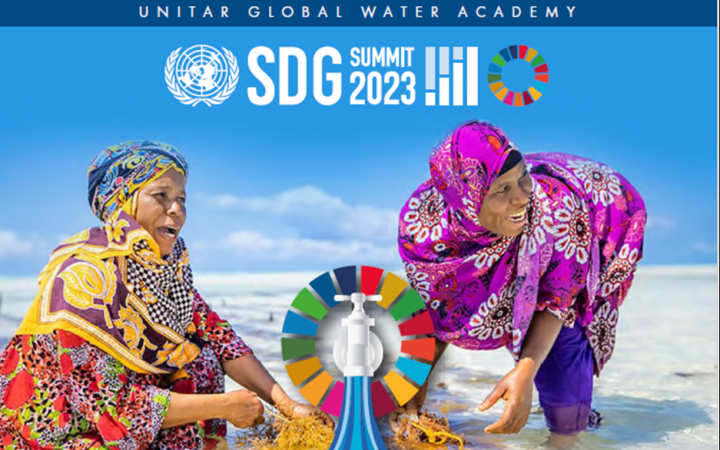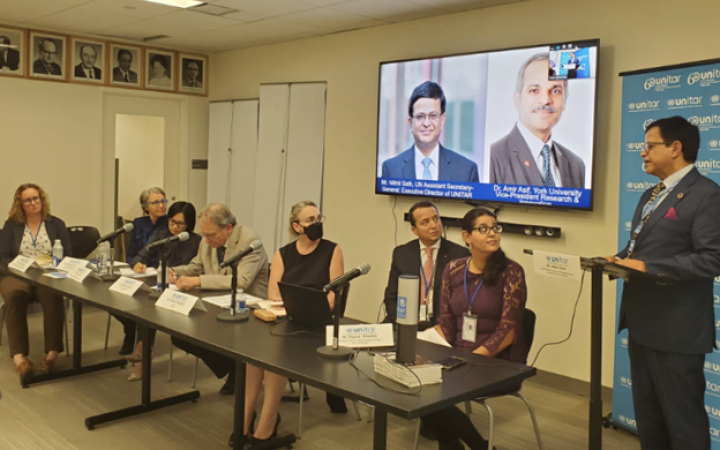18 September 2023, New York, USA – UNITAR proudly announces the launch of its three hybrid events during the 2023 SDG Summit, under the auspices of the United Nations General Assembly entitled, ‘Developing a Blueprint for Civil Society Private Sector Contributions: Towards the Elaboration of a Comprehensive and Integral International Convention on the Rights of Older Persons’; ‘What if Women Designed the City?’; and, ‘Harnessing the power of big data, novel technologies, and international collaboration to address global water insecurity’.
The 2023 SDG Summit marks the halfway point of the 2030 Agenda. Secretary-General, Antonio Guterres stated the reports of the SDGs are clear:
With only 15 per cent of the targets are on track and many are going in reverse. Instead of leaving no one behind, we risk leaving the SDGs behind. So, Excellencies, the SDGs need a global rescue plan.
A Call for an International Convention on the Rights of Older Persons
To ensure we leave no one behind, UNITAR’s first event in collaboration with the Global Initiative on Ageing, and G3ict, called for an International Convention on the Rights of Older Persons. Such a convention would provide Older Persons with a comprehensive framework to promote and safeguard their rights, covering areas such as healthcare, social protection, employment, and participation in decision-making processes. Currently, no such Convention exists. Under SDG indicator 1.3.1, the SDGs call for social protections to cover vulnerable persons such as older persons, and additionally set the targets under 11.2, to provide safe, sustainable, affordable, accessible transport for older persons, and under 11.7 extend that access to providing older person universal access to green and public spaces.
Ambassador Luis Gallegos, Chair of UNITAR's Board of Trustees, and President of the Global Initiative on Aging Foundation argues:
Although States have the primary responsibility to promote, protect, respect, and fulfil human rights, there is a paramount role of different stakeholders in shaping and duly implementing an adequate legal framework to protect older persons.
The stakeholders involved in the consortium of this event included the CEO and President of G3ict, Mr. Axel J. Leblois, AARP, Director of Technology Strategy & Relationships, Mr. Michael Philips, Vice-President of Institutional Relations and Advocacy at G3ict, Ms. Francesca Cesa Bianchi, Vice President of Global Initiative on Ageing, Ms. Silvia Neira, Principal of Boston Consulting Group, Ms. Hillary Rose Martinez Wool, Head of Global Patient Insights and Advocacy, Mrs. Frances West, Founder of FrancesWestCo and Author, and Healthcare Government and Public Affairs EMD Serono/Merck Healthcare, Ms. Hazel Moran. In addition to the panellists, the event was joined by 20 UN New York-based delegates in person and nearly 300 participants online. Through the collaborative effort of panellists, participants, and stakeholders beyond, a framework to protect older persons will take a united effort.
Ms. Silvia Neira further commented:
We know that from the data on ageing, it's about prevention. The conversation has to start way earlier about what it means to look ahead when you’re older to age gracefully and with options.
In designing a Convention based on prevention, Mr. Axel J. Leblois further urged that the Convention needs to:
Act as a catalyst for the ecosystem to take place for caregivers, private sector entities, and local governments to create a symbiotic action between them that ensures an older person can actively participate in this discussion.
To view the recorded webinar, please follow this link.
What if Women Designed a City? Intersecting SDG 5 and SDG 11
During UNITAR’s second event at the SDG Summit, “What if Women Designed a City?”, continued the dialogue on inclusivity in terms of the intersection between SDG 5 and 11. The event brought together over 150 participants online and built a discourse on women’s repositioning in society and the accelerated pace of urbanization.
The panellist was joined by UNITAR Fellow, Dr. May East, Renowned Author and International Advisor on the Future of Cities, Mr Charles Schmidt-Landry, Deputy Mayor of Finance and Public Procurement, Ms Audrey Henocque, Senior Planner from the City of Vienna, Ms Lena Rucker, Senior Planner from Glasgow City Council, Ms. Sarah Shaw, Senior Planner of Barcelona Regional, Ms Ana Paricio Carceles, Gender Equality Advisor of the Sexual and Reproductive Health Research at WHO, Dr. Anna Coates, with opening remarks by the UN Assistant Secretary-General, and UNITAR Executive Director, Mr. Nikhil Seth, and closing remarks by Director of People and Social Inclusion at UNITAR, Mr. Alex Mejia.
In moderating this event, Dr. East commented that:
Historically cities have been built through men's perspective as a reference. What is known as gender usually reproduces gender stereotypes that limit women's care roles. We need to instil the message to not use an old road map where able-bodied men are prioritized, and instead ensure that our cities co-evolve, [...where] we focus our collective gaze on what is strong, not what is wrong.
Furthermore, Mr. Nikhil Seth mentioned:
The Mayor of Bogota, Mr. Peñalosa said, ‘the way a mayor designs a city reflects society’s attitudes in the city’ [...] By extending this example to cities designed by women, their perspectives are extremely important and often ignored. Women need to be included in the dialogue around the issue of security, for women and their families, their children, for transit to make it to work, or to take their children to school, where even to walk to toilets in poorer countries is often a minefield. So if women were to design cities, they would be of course a greater focus on the issue of security.
In the Secretary-General’s remarks at the SDG Summit, Mr Antonio Guterres echoed these issues of security by stating:
There is a need to ensure full gender equality. It’s long past time to end discrimination, ensure a place at every table for women and girls, and end the scourge of gender-based violence.
Through hearing from city planners from various municipalities on the panel, the women present said they would act on these issues by designing a city that includes gender mainstreaming elements into the planning process for schools, public spaces, mobility, green spaces, social infrastructure, and community. Moreover, the panellist suggested they would also ensure a participatory gender-sensitive approach takes a holistic action plan in making proposals, providing tools, and establishing policies, protocols, and rules that act to empower women in public spaces, and their communities. Additionally, as the power is in the purse, Ms Audrey Henocque commented that a gender budgeting approach would make it possible to ensure inclusive spaces are upheld in an egalitarian city where actions are implemented to impact the well-being of all genders. Each of these actions is integral in safeguarding the security of women as they design the cities of tomorrow where all voices are heard, and no one is left behind.
To view the recorded webinar, please follow this link.
UNITAR's Global Water Academy Reconvenes at the SDG Summit
During UNITAR’s last event at the 2023 SDG Summit, the Global Water Academy reconvened on the topic of ‘Harnessing the power of big data, novel technologies, and international collaboration to address global water insecurity’ brought together over 150 online participants to join panelists including, Vice President of Research and Innovation at York University, Dr. Amir Asif, York University Research Chair in Global Change Biology, Dr. Sapna Sharma, Director, of UNU-INWEH, Dr. Kaveh Madani, Director, of UNU-INWEH Water Without Borders Program, Dr. Lina Taing, Research Hydrologist from NASA, Dr. Michael Jasinski, CEO of mWater, Dr. Annie Feighery, Professor of Water Security, and Deputy Head of University of Newcastle School of Engineering, Prof. Claire Walsh, Ecosystem Scientist from the Cary Institute of Ecosystem Studies, Dr. Kathleen Weathers, with opening remarks by the UN Assistant Secretary-General, and UNITAR Executive Director, Mr. Nikhil Seth, and closing remarks by Director of People and Social Inclusion at UNITAR, Mr. Alex Mejia.
During this hybrid event, panellists highlighted how over two billion people do not have safe access to clean water. To resolve this issue, the panellists discussed the power of harnessing open data, novel technologies, and inclusive international collaborations to quantify water insecurity around the globe.
In being cautious about the role that data impacts water insecurity, Dr. Madani commented:
Data is useful but data in itself doesn’t bring wisdom. Contextual knowledge is needed to turn data into useful information. Otherwise, too much data can even become misleading, as we saw during the last pandemic.
As such, through advancing remote sensing technologies, inclusive global networks, and increased accessibility of open-access data, the panellists critically examined opportunities to further understand freshwaters around the world, including in regions that previously were relatively unexplored or suffered from insufficient access to resources.
For instance, Dr. Michael Jasinski from NASA discussed the instrumental value of satellite imaging to defer elements of groundwater, ice, ocean, and inland water height, water quality, deformation, and soil moisture levels. Moreover, Jasinski discussed NASA’s newest mission launched in the Yukon to reveal the surface water ocean topography present in the region. Additionally, the NISAR mission obtained data to estimate fluctuations in groundwater aquifers, which offered effective insights into monitoring groundwater in other water-insecure regions.
Furthermore, Prof. Claire Walsh provided a stakeholder and power analysis to discuss the intersection between the level of interest and influence between engaging with entities and communities for leveraging data from local knowledge systems, novel technologies, remote sensing, and capacity development.
By developing inclusive, diverse, interdisciplinary collaborative teams, York University has been the leading academic partner guiding UNITAR’s Global Water Academy by integrating research disciplines, incorporating new technologies, and sparking creative solutions in the Academy’s dialogues that act to safeguard our global freshwater resources and work towards a future of equitable access to clean freshwater worldwide.
Dr Amir Asif stated:
The challenge we face with the global water crisis is immense, and it demands a response of equal measure. The UNITAR Global Water Academy helps us envision the forward-thinking response the world needs. One that embraces big data, cutting-edge technologies, and an all-hands-on-deck approach. These elements are essential to deepening our understanding of water-related issues, developing scientific solutions, and advancing SDG 6.
Mr. Alex Mejia commented that:
Dr Asif and his team are the ones that have empowered us to bring this Water Academy to fruition, and I simply want to express our appreciation and also say that there are very many things ahead that we will be doing, and that is, of course, an honour for us.
UN Assistant Secretary-General, and UNITAR Executive Director, Mr. Nikhil Seth stated in his remarks:
“What we're trying to do here is swim [with the UNITAR Global Water Academy], in the world of research and academia, with the world of capacity-building. Changing water insecurity is probably one of the toughest challenges of humankind”.
With York University acting as academic lead of UNITAR’s Global Water Academy, the hybrid event examined practical solutions from world-class experts to ensure those challenges are met with effective responses and answers.
For more information regarding this event, and to view the recorded webinar, please follow the link below.


